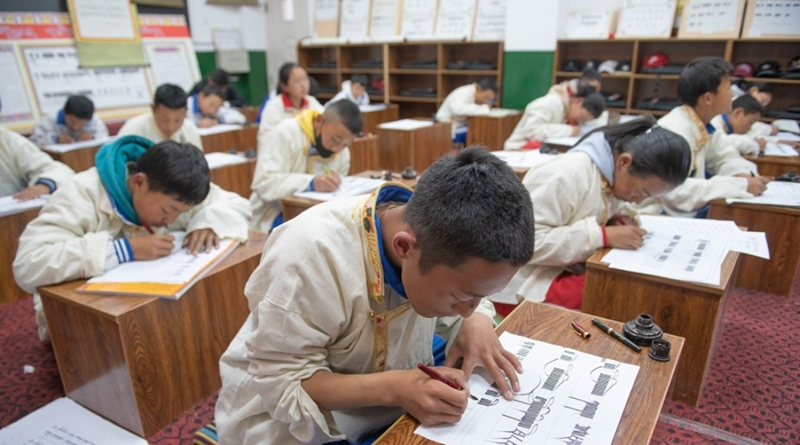Dharamshala — The Chinese Education Bureau has announced ban on Tibetan language classes in primary and secondary schools in so called Kardze Tibetan Autonomous Prefecture, which comprises 18 counties, in the Kham region of eastern Tibet. The students completing this academic year will be the last to have studied the Tibetan language in Kardze prefecture. This ban violates the fundamental rights of young Tibetans to learn their mother tongue.
According to the notification issued at the beginning of September 2023 by the Chinese education bureau in so called Kardze Tibetan Autonomous Prefecture, which bans Tibetan language classes in primary and secondary schools in the prefecture, Tibetan teachers have had to leave their schools and are unemployed, forced to seek other employment.
"Tibetan teachers proficient in Mandarin have been assigned to teach classes in Chinese whilst those without the Chinese language skills have been marginalised into unemployment, leaving them to search for teaching jobs in neighboring Ngaba County. Others have been considering starting small businesses," Tibet Watch wrote.
According to Tibet Watch, the students finishing this academic year will take their final exams at Ngaba National High School in Ngaba Tibetan and Qiang Autonomous Prefecture. They are the last graduates to have studied the Tibetan language at the Kardze Prefecture.
In recent years, the Chinese government has stepped up measures to restrict the learning of the Tibetan language, arresting Tibetans who defend the right to learn Tibetan, arresting and imprisoning Tibetan intellectuals, writers and teachers, suppressing online Tibetan language courses and shutting down groups that teach Tibetans in their region, and tightening restrictions on individuals and organisations offering tutoring to children.
The Chinese government's policies to eliminate Tibetan identity by banning the Tibetan language from schools and placing more than a million young Tibetan children in Chinese colonial boarding schools are in a critical situation. These Tibetan children are forcibly separated from their parents, families, culture, language and religion and are taught Chinese culture and language. These policies violate the fundamental rights of young Tibetans to learn their mother tongue.
China-Tibet: The one-thing you need to know
Over the past 70 decades, there has been ongoing political repression, social discrimination, economic marginalization, environmental destruction, and cultural assimilation, particularly due to Chinese migration to Tibet which is fueling intense resentment among the people of occupied Tibet.
The communist-totalitarian state of China began its invasion of Tibet in 1949, reaching complete occupation of the country in 1959. Since that time, more than 1.2 million people, 20% of the nation's population of six million, have died as a direct result of China's invasion and occupation. In addition, over 99% of Tibet's six thousand religious monasteries, temples, and shrines, have been looted or decimated resulting in the destruction of hundreds of thousands of sacred Buddhist scriptures.
Until 1949, Tibet was an independent Buddhist nation in the Himalayas which had little contact with the rest of the world. It existed as a rich cultural storehouse of the Mahayana and Vajrayana teachings of Buddhism. Religion was a unifying theme among the Tibetans -- as was their own language, literature, art, and world view developed by living at high altitudes, under harsh conditions, in a balance with their environment.


![Tibet has a rich history as a sovereign nation until the 1950s when it was invaded by China. [Photo: File]](/images/stories/Pics-2024/March/Tibet-Nation-1940s.jpg#joomlaImage://local-images/stories/Pics-2024/March/Tibet-Nation-1940s.jpg?width=1489&height=878)


















